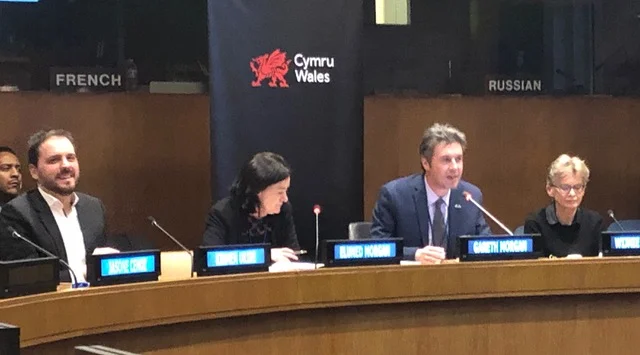WSWNE’s Invitation to the United Nations
The front of the United Nations in NYC
An invitation from the Welsh Government for us to attend a conference on the UN’s 2019 “Year of the Indigenous Languages” prompted three members of the WSWNE Board to travel to New York City in February, 2019. The conference was titled: Promoting Multilingual Societies: Prospectives from Wales, The Basque Country, Flanders and Quebec.
The conference was headed by Gareth Morgan, the Head of the Welsh Government in the USA and included representatives of the Dutch, Flemish, Basque, Québécois and Welsh languages. Each speaker discussed the percentages of the population in their country who spoke the indigenous language, as well as the progress being practiced and the government policies being practiced to ensure the protection and the future of the language.
Panels members from left to right, Representative of the Basque language, Minister Baroness Eluned Morgan, head of the Welsh Government in the USA Gareth Morgan, and the representative of the Dutch language.
Baroness Eluned Morgan, Wales’ Minister for International Relations and the Welsh Language, spoke along the same lines. Welsh is spoken fluently by 20% of the population, whereas it was 50% at the beginning of the 20th century. Welsh Government policies have stabilized the decline and now the percentage is increasing. Welsh is also supported in the workplace, and many businesses now have Welsh speakers in place, especially in hospitals and local government offices. The Welsh Government also provided extra funding for councils to build Welsh language schools and the plan is to double the number of children in those schools in 10 years. Teachers are also receiving higher salaries if they speak Welsh. More and more text books are being printed in Welsh and employees in workplaces wear pins to identify themselves as Welsh speakers to encourage customers to speak the language.
WSWNE members Susan Davies Sit, Susan Jenkins Meers and Shirley Jones Gilmartin at the United Nations.
Wales is heralded as very successful in coming back from the brink of an endangered language, and now is growing, with a goal of 1M speakers by 2050. Govopps.co.uk stated: “The Minister will be speaking on…. the unique approach being taken in Wales to promote and encourage use of the Welsh language, including through our new school curriculum which proposes to teach Welsh as a first language to all learners. The minister will point out that Welsh is still very much a living language in a society dominated by a global language, which in itself is testament to the remarkable story of the survival of the language against all the odds, at a time when other Celtic languages have declined.”
It became obvious to the audience that the most success for an indigenous language survival is in Québec due to government policies put in place to protect the language, especially one to ensure that allophone immigrants, who spoke neither Quebec’s English or French at the point of immigration, had to enroll their children in French-only schools. The language is flourishing.
Basque is succeeding through education in schools, and 10% of their population use Basque more than Spanish. Dutch is spoken by 60% of the people in The Netherlands but English takes over in most business situations and Dutch is weakening.
Peace statue outside the United Nations
The UN.org site states: the Permanent Forum expressed concern that 40 per cent of the world’s estimated 6,700 languages were in danger of disappearing— the majority belonging to indigenous peoples.
Following the conference, we had a chance to speak one-on-one with Minister Eluned Morgan about Welsh Societies in North America and how we promote Wales, and her culture and language. We re-connected with Gareth Morgan who reminded us that he is available to come and talk to us at a luncheon.
Representatives of the Welsh Government handed out postcards containing a poem that Literature Wales had commissioned National Poet of Wales, Ifor ap Glyn, to compose. The poem “Lleiso (Voicing) is copied here. Enjoy…. and you can be involved by being one of the people learning Welsh: try SaySomethinginWelsh or Duolingo!
nomina si pereunt, perit et cognitio rerum
“os derfydd enwau,
derfydd hefyd dirnad pethau”.
Dwedwch felly, fawrion o wybodaeth,
ym mha fodd mae achub iaith?
Nid trwy’i chofnodi, na’i chysegru,
na chloi’i geiriau’n gacamwci gludiog
a lyno wrth y sawl
sy’n stelcian hyd ein cloddiau;
cans cadno wedi’i stwffio
yw pob Cymraeg llyfr;
ei ‘untroed oediog’ ni syfla mwy,
a’i lygaid gwydr sydd ddall.
Yn y llafar y mae ei lleufer;
a thafodau plant yw ei pharhâd.
Ifor ap Glyn
Bardd Cenedlaethol Cymru
27.1.19
nomina si pereunt, perit et cognitio rerum
“if the names are lost,
our knowledge of things dies too”.
So pray tell us, enlightened ones,
how is language to be saved?
Not by annotation, nor consecration,
nor by locking words down like sticky burrs
that may cling to those
who prowl our perimeters;
because Welsh, written,
is but a stuffed fox;
its ‘mid-air paw’ will move no more,
its glassy eyes unseeing.
Its verve comes from being voiced;
and on children’s tongues, it will live on.




